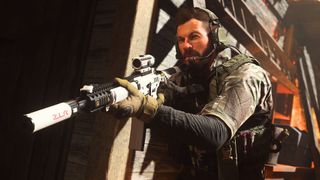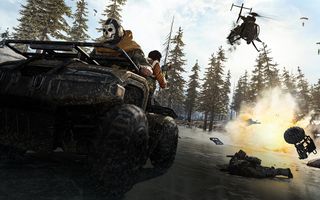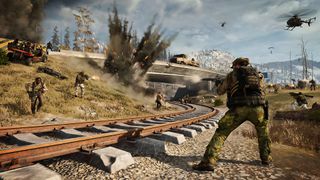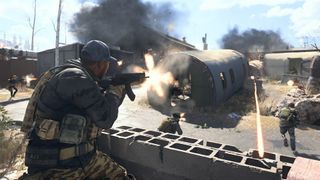Warzone quads is just as much fun when you're dead
Every squad needs their eye in the sky.


Warzone map: Best loot spots
Warzone loadouts: The gear to choose
Warzone bunkers: All vault locations
Warzone guns: The best firearms listed
Best M4A1 loadout Warzone: Top all-purpose AR builds
Best MP7 loadout Warzone: Effective SMG setups
Best Grau loadout Warzone: Strong AR drops
Best M13 loadout Warzone: The attachments to choose
In a genre that still heavily resembles PUBG, Warzone’s small innovations are clear and obvious. This is the battle royale which, like the hunky doctor in a cheesy medical drama, just won’t let you die, dammit. It swaddles you in armour, thick enough to absorb half a clip of enemy fire while you find cover. It allows your teammates to pull you back to your feet if you’re downed. And should that fail, you go to the gulag for a shot at resurrection. Even once consigned to the grave, your squad can always perform an unholy ritual at a Buy Station to bring you back, should they have the cash and spiritual flexibility.
It’s a formula full of contingencies that can turn matches into long and satisfying struggles for life—creating story arcs in which you’re repeatedly pulled back from the brink. But on a bad day, all those potential leg-ups conspire to compound your woes. There aren’t many other shooters in which you can exchange half an hour’s careful play for a kill/death ratio of -3.
It’s just as well, then, that there’s a second, great game waiting on the other side of the veil. The truth is that Warzone is less about shooting than it is orienteering - plotting a course through a landscape that’s in constant flux, a world where picking the wrong point on the compass can have lethal consequences for your whole team. In that context, it helps to have a player watching from above, dedicated to the high-level planning of your frantic operation.
It’s a convenient argument for a middling battle royale player to make, I’ll admit—but after months of play, I’m convinced I’m more use to my Call of Duty group once I’ve been shot through the head, booted out of the gulag, and divorced from my corporeal form. My friends on the ground have enough to think about - finding and upgrading gear, keeping out of sight, and should it come to it, bludgeoning a stranger with the oversized butt of a rocket launcher. It benefits them to have a full-time squaddie in the sky.
The original Modern Warfare fixated on the figure who observes the battlefield from afar, participating in conflict from a perspective that could be characterised as cowardly or dangerously aloof. The game’s famous gunship mission, Death From Above, placed you behind the cannon of an AC-130 Spectre and asked you to fire on targets so distant that friend and foe were difficult to distinguish. Your colleagues aboard the Spectre spoke in muted office-voice, and sometimes laughed at the carnage down below, as if it weren’t quite real. The level of remove was disturbing.

With that point well-made, however, the series struggled to build on its foundation. Treyarch’s Black Ops featured a mission in which you flew a reconnaissance aircraft and commanded CIA troops on the ground via a thermal screen, as if playing Command & Conquer. But that level swiftly moved on, more concerned with swapping breathlessly between characters than capturing the difficulty of determining right from wrong at 85,000 feet. In the decade since, COD has by and large kept its boots on the ground.
Warzone, though, provides a new opportunity to play analyst. The battle royale format might be a little too daft to capture the moral ambiguity of the eye in the sky—this isn’t Death From Above Part 2. But it does give you an emergent battle to watch, second-guess, and communicate to your teammates.
The biggest gaming news, reviews and hardware deals
Keep up to date with the most important stories and the best deals, as picked by the PC Gamer team.
Information gathering is a demanding process. Your surviving team members give you access to a maximum of three roaming cameras, which shouldn’t be underestimated—you’d be surprised what you can spot in another player’s peripheral vision when they’re preoccupied with the business of moving and shooting. Nonetheless, it’s a narrow view of the action.
Then there’s the world map. There, nearby gunfights pop up as red blips, though you can only ping one of them at a time, holding the rest in your head. Once those guns fall silent, it’s up to you to work out where their owners have moved next. Topography like dams and cliff faces can tell you where teams are likely to be funnelled ahead of the encroaching gas; Buy Stations and buildings can tell you their probable destinations.

There’s a decommissioned nuclear bunker in York where, it was planned, intelligence specialists would predict the direction of fallout on the wind and advise military units moving across the UK accordingly. At times, Warzone analysis is comparable: your job is to judge the likely flow of squads throughout the terrain, and prevent your team from getting caught up in the circle-shrinking crunches that claim the lives of most midgame players.
The gaps in your knowledge are frightening, and can only be filled by hypotheses. But there’s something exciting about that guesswork, too. It takes COD to a cerebral place. You’re not just reading the map, but acting as an amateur player psychologist. You’re asking the question: where would I go, if I was them? When you get it right, alerting your team to dangers, finding them vehicles, and guiding them safely to a spot where they can hunker down or recharge to full strength—it’s as satisfying as any headshot.
There have been attempts to make this sort of high level shooter strategy explicit; you might remember the Commander iPad app for Battlefield 4, which let tacticians observe live games and issue orders—OK, maybe suggestions—to players down below. But DICE stopped supporting it a year and a half in. Maybe the idea of taking control was too intimidating for most players. Better, perhaps, to leave this kind of play buried within the games themselves—so that, through the accumulation of countless wins and losses, all Warzone players slowly start to think like analysts.
After all, every squad needs a strategist, just as much as they need a healer or crack sniper. At least, it’s important for my self-worth that I believe that.
Most Popular


